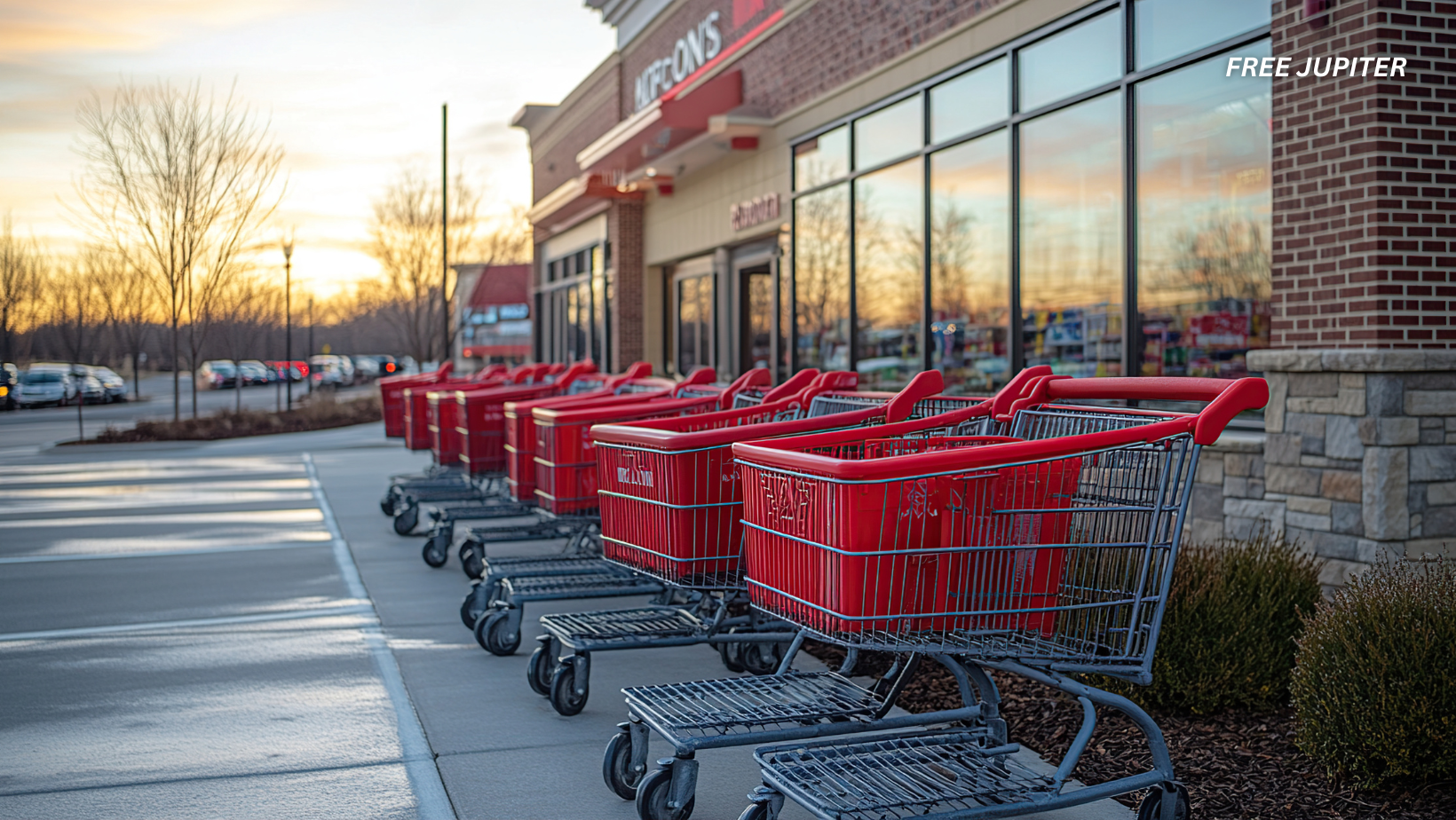Friendly Note: FreeJupiter.com shares general info for curious minds 🌟 Please fact-check all claims—and always check health matters with a professional 💙
In a typical supermarket parking lot, an unnoticed drama unfolds every single day. Some shoppers dutifully push their empty carts back to the designated corral, neatly tucking them into place. Others, often in a rush or just not thinking much about it, leave the cart perched on a curb, lodged between cars, or simply rolling freely in the wind.
At first glance, it seems like a meaningless choice. But dig a little deeper, and psychologists say this small action is actually a surprisingly powerful indicator of personality. It’s been dubbed the “Shopping Cart Theory,” and it’s essentially this: when no one’s watching and there are no real consequences, do you still do the right thing?
There’s no fine if you skip the cart return. No bonus points if you do it. Yet that tiny decision can speak volumes about who you are.
Let’s unpack the fascinating psychology behind this simple behavior—and explore what regularly returning a shopping cart might suggest about your character.
1. You’re Conscientious: The Quiet Architect of Order
Psychologists often refer to the “Big Five” personality traits, and conscientiousness is one of them. It’s not about being uptight or rigid—it’s about being thoughtful, responsible, and dependable. Conscientious people are the ones who plan ahead, stay on task, and feel personally invested in doing things properly.
Returning your cart isn’t a grand act, but it checks all the conscientiousness boxes:
- You finish what you started. Your shopping trip doesn’t feel over until everything is in its rightful place.
- You value tidiness. Rogue carts create chaos and even fender benders. Putting them away keeps the lot safer and neater.
- You’re self-disciplined. Even when you’re tired, in a rush, or it’s pouring rain, you still make the trip back to the corral.
In various studies, conscientious individuals tend to avoid behaviors that might inconvenience others. They resist the urge to take shortcuts. They’re the ones who send the RSVP, return the library book, and show up five minutes early.
You won’t always hear these people brag about their behavior—it’s not about attention. It’s about quietly maintaining order in a world that can easily unravel.
2. You’re Empathetic: You Think About the Next Person
It takes empathy to return a cart—not a dramatic kind, but a subtle one. You’re not just thinking about your own convenience. You’re thinking about:
- The tired parent with a toddler in tow who needs that cart next.
- The employee who has to chase carts across the lot in the blazing sun.
- The driver who could find a dent in their door thanks to a runaway trolley.
Empathy is about putting yourself in someone else’s shoes—even if you’ll never meet them. It’s imagining how a small action might create a ripple effect of inconvenience or relief.
Social norms matter here too. These aren’t hard rules written on a wall. No one says, “You must return your cart, or else!” But returning it anyway reflects an awareness of how your actions affect the people around you.
Empathetic individuals are particularly sensitive to these unspoken rules. They’re the ones who slide their cart all the way in, secure the child seat, and maybe even gather a stray cart along the way. Each act quietly says, “I see you—even if you’re not here right now.”
3. You Have an Internal Moral Compass: You Do the Right Thing Even When No One’s Watching
This is what psychologists call an internal locus of control. People with this trait believe their actions matter. They don’t wait for rules, rewards, or punishments to guide their decisions—they follow their own sense of right and wrong.
Let’s be honest: most public behavior is shaped by consequences. You wear your seatbelt because you’ll get a ticket if you don’t. You pay for your groceries because the cashier’s watching.
But the cart return? That’s a different story. No one’s monitoring you. There’s no prize. Yet some people still do it every time.
This shows a powerful level of self-governance—the ability to regulate your own behavior even in the absence of accountability. It also tends to show up in other areas of life, such as:
- Finishing work early even when the boss isn’t checking.
- Recycling even when it’s a hassle.
- Choosing not to cheat, even when it would be easy.
People with a strong internal compass tend to act consistently across situations. They don’t need applause—they act according to their own values.
Read more: You’ll Be Shocked How Many Trees Lightning Destroys Every Year
4. You Think Long-Term: Trading Ease Now for Order Later
Think back to the famous “marshmallow test” from the 1970s. Children were offered a choice: eat one marshmallow now, or wait a few minutes and get two. The kids who delayed gratification were more likely to succeed in school, stay healthy, and manage money wisely as adults.
Returning a shopping cart is, in a way, a grown-up version of that test.
- Immediate reward: Get into your car faster.
- Delayed reward: A cleaner, more organized parking lot for everyone (including you next time).
Future-oriented people are constantly making these kinds of trade-offs. They skip fast food for long-term health. They save money instead of splurging. They take reusable bags to reduce waste.
These aren’t always glamorous decisions, but they add up over time. And often, they begin with a mindset that values collective outcomes—even if the individual payoff is small.
Fascinating fact: A 2022 cross-cultural study across 22 countries found that societies with stronger future-oriented mindsets had cleaner cities, higher levels of civic cooperation, and fewer social conflicts. Small habits really do ripple outward.
5. You Care About Your Community: Small Acts That Signal Big Values
Civic-mindedness is a sense of shared responsibility. It’s the belief that we all have a part to play in maintaining public spaces—not because we’re forced to, but because it’s our space.
Returning a shopping cart may not feel like a big deal, but it’s a perfect example of what sociologists call a public good—something that benefits everyone, whether they helped create it or not.
Think of other public good behaviors:
- Voting in an election (even when your one vote feels insignificant)
- Cleaning up after yourself at a park or café
- Shoveling your sidewalk so no one slips
In each case, the easy thing is to let someone else handle it. But cart returners don’t “free-ride.” They pitch in, often without expecting anything in return.
They stack their dishes. They close gates on hiking trails. They wipe down the gym equipment. They’re the people who say, “I live here too—and I care.”
These Traits Work Together, Not in Isolation
The beauty of all this? These traits don’t exist in separate bubbles. They overlap and support each other:
- Empathy boosts conscientiousness: “If I don’t put this cart away, someone else will suffer.”
- Internal morality powers future choices: “I want to be the kind of person who thinks ahead.”
- Civic-mindedness connects them all: “We’re in this together—so I’ll do my part.”
While life circumstances (like being sick, elderly, or in a hurry) can sometimes get in the way, the pattern still holds. People who regularly return shopping carts tend to make pro-social choices in other areas too. Not always perfectly—but more often than not.
Read more: Perseid Meteor Shower Is Coming—But Something’s Going to Ruin It
Final Thoughts: It’s More Than Just a Cart
It’s easy to overlook something as mundane as returning a shopping cart. But this small act can serve as a mirror—reflecting who you are when nobody’s watching, and hinting at the inner values that guide your behavior.
Conscientiousness. Empathy. Integrity. Future-thinking. Civic responsibility.
These traits may not shout for attention. But they quietly shape the world around us—in cleaner parking lots, lighter workloads for store employees, and a more considerate community.
So the next time you steer your cart back into place, take a moment to smile. You’re not just organizing metal and wheels—you’re helping build the kind of world we all want to live in.










